Is Lake Tai the Most Picturesque Lake in China? Find Out!
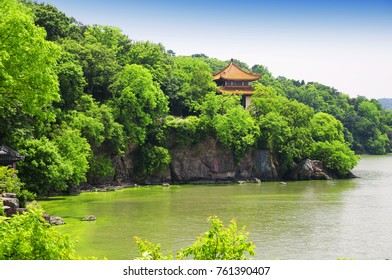
An Essential Guide to Visiting Lake Tai
Nestled amidst the picturesque landscapes of Jiangsu and Zhejiang provinces, Lake Tai is not just China’s third-largest freshwater lake; it is a breathtaking tapestry of shimmering waters, lush greenery, and rich cultural heritage. What truly sets Lake Tai apart is its enchanting network of islands and scenic parks, where visitors can experience the perfect blend of nature and tranquility. Imagine drifting across the lake’s serene surface, surrounded by the sounds of chirping birds and the gentle rustle of leaves, while marveling at the vibrant lotus flowers that bloom in the warm sunlight.
In this guide, we will take you on a journey through the must-see attractions around Lake Tai, including the charming town of Huzhou, renowned for its stunning parks and captivating boat rides. We will also share insider tips on the best activities, such as birdwatching, leisurely strolls along paved paths, and indulging in local culinary delights. Whether you’re a nature lover, an adventure seeker, or a culture enthusiast, this essential guide will equip you with everything you need to make the most of your visit to this breathtaking destination. Embrace the serenity of Lake Tai, and discover the magic that awaits!
In This Guide
- An Essential Guide to Visiting Lake Tai
- The Rich History and Legends of Lake Tai
- Main Highlights: What You Absolutely Can’t Miss
- Planning Your Visit: A Practical Guide
- Tickets: Prices, Booking, and Tips
- How to Get There: A Complete Transportation Guide
- Local Cuisine and Accommodation Nearby
- Frequently Asked Questions
- Final Thoughts on Your Trip
The Rich History and Legends of Lake Tai
Tracing the Timeline of Lake Tai
Lake Tai, known as Taihu (太湖) in Mandarin, is not just a scenic body of water—it is a tapestry woven with rich history, culture, and folklore that has captivated visitors for centuries. Nestled in the Jiangsu and Zhejiang provinces of China, this expansive freshwater lake has been a vital part of the region’s development and a source of inspiration for artists, poets, and philosophers alike.
Ancient Beginnings
The origins of Lake Tai date back to the prehistoric era, with evidence suggesting human settlements along its shores as early as 4000 BC. The lake has served as a crucial resource for agriculture, fishing, and transportation throughout its history. The surrounding land has been fertile, leading to a thriving agrarian society that flourished under the influence of the Wu and Yue kingdoms during the Spring and Autumn period (770–476 BC).
The Imperial Era
During the Tang (618–907 AD) and Song (960–1279 AD) dynasties, Lake Tai rose to prominence as a cultural and economic hub. The lake was not only a source of freshwater and fish but also a significant site for the production of silk and tea. The picturesque scenery around Lake Tai inspired numerous poets and artists, leading to a flourishing of the arts. The famous poet Bai Juyi, for instance, penned verses that celebrated the lake’s beauty, and many painters depicted its serene landscapes.
The Legend of the Three Fairy Sisters
One of the enchanting legends associated with Lake Tai is that of the Three Fairy Sisters. According to local folklore, these sisters descended from the heavens to enjoy the lake’s beauty. They were said to possess magical powers and would often help the local villagers with their daily struggles. However, upon realizing that the beauty of Lake Tai was attracting more and more visitors, the sisters decided to return to the heavens, leaving behind a shimmering pearl submerged in the lake that is believed to enhance the lake’s enchanting allure.
The Modern Era
In the 20th century, Lake Tai underwent significant changes. The rapid industrialization of the surrounding areas led to environmental challenges, including pollution. However, in recent years, efforts have been made to restore the lake’s ecological balance. Local governments have initiated conservation projects to protect the lake’s ecosystem, making it a popular destination for eco-tourism and outdoor activities.
Cultural Significance
Today, Lake Tai is not only a visual feast but also a cultural treasure. The lake is home to ancient temples, pagodas, and historic towns like Wuxi and Suzhou, which reflect traditional Chinese architecture and customs. The region’s culinary scene is also influenced by its aquatic heritage, with local specialties like Taihu fish and the famed Taihu lotus root.
Conclusion
As you explore the shimmering waters and lush landscapes of Lake Tai, you are not merely visiting a picturesque lake; you are stepping into a realm steeped in history and legends. From ancient settlements to modern conservation efforts, Lake Tai continues to be a vital part of China’s cultural fabric, enchanting all who venture to its shores. Whether you’re drawn by its natural beauty, rich heritage, or the timeless stories that echo through its waters, Lake Tai promises an unforgettable experience for every traveler.
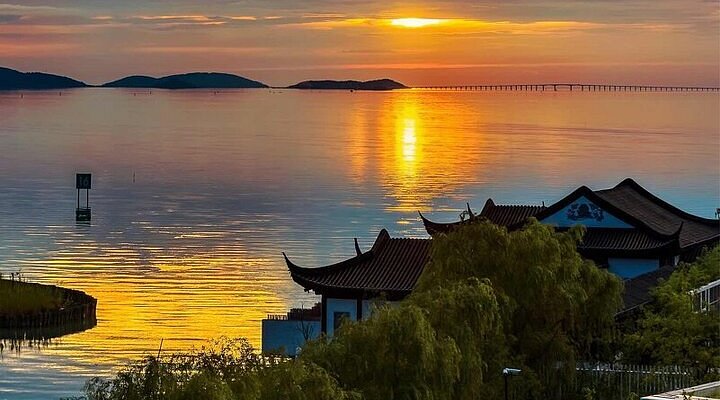
Lake Tai.
Main Highlights: What You Absolutely Can’t Miss
Explore the Serene Shores of Lake Tai
Lake Tai, one of China’s largest freshwater lakes, offers a harmonious blend of natural beauty and cultural richness. Here are the must-visit highlights that will make your trip truly unforgettable.
Taihu Lake Scenic Area
Step into a verdant paradise at the Taihu Lake Scenic Area, where lush landscapes meet a tranquil waterfront. This expansive park provides a delightful mix of walking paths and boating adventures. Rent a boat and glide across the shimmering waters, hopping between the charming islands scattered throughout the lake. Be sure to pack a hat and water, as tree cover can be sparse. The park is ideal for a leisurely half-day visit, and you can unwind with a meal at one of the lakeside restaurants afterward.
Bird Watching Paradise
For nature enthusiasts, the area offers pristine spots for bird watching. The diverse habitats around the lake attract numerous bird species, making it a delightful location for both amateur and seasoned birders. Bring your binoculars and take a peaceful stroll along the lakeshore to spot these feathered friends in their natural habitat. Early mornings are particularly rewarding, with the added benefit of cooler temperatures.
Iconic Sculptures
Don’t miss the striking sculptures located throughout the park, particularly the enormous fruit and vegetable bowls that add a quirky touch to the landscape. These artistic installations make for great photo opportunities, so be sure to capture some fun shots against the backdrop of the picturesque scenery. The sculptures are located near the main walking paths, making them easy to find during your exploration.
Huzhou Taihu Lake Paradise
For families or those seeking a bit of adventure, Huzhou Taihu Lake Paradise is a must-visit. This amusement park combines the thrill of rides with the natural beauty of the lake. Enjoy a day of fun with various attractions that cater to all ages. Remember to check the opening hours and plan your visit accordingly, especially on weekends when crowds can swell.
Qiucheng City Ruins
History buffs will appreciate a visit to the nearby Qiucheng City Ruins, an ancient site that dates back to the Southern Song Dynasty. Explore the remnants of this historical city, offering a glimpse into China’s rich past. A guided tour can enhance your experience, providing context and stories behind the stones. Wear comfortable shoes, as the area can involve a fair amount of walking.
Huzhou Huanglong Palace
For a spiritual retreat, head to Huzhou Huanglong Palace, a tranquil site located a short distance from the lake. This beautiful temple complex is set against a backdrop of lush mountains and is perfect for quiet contemplation. Explore the intricate architecture and serene gardens, and don’t miss the chance to participate in a traditional tea ceremony at one of the local tea houses.
Local Cuisine
Finally, no visit to Lake Tai is complete without indulging in the local cuisine. Be sure to try Taihu’s famous freshwater fish dishes and the region’s renowned tea. Restaurants around the lake offer a variety of dining options that showcase the best of Jiangsu and Zhejiang culinary traditions. Enjoy a leisurely lunch while soaking in the stunning lake views.
Final Tips
- Transportation: Consider renting a bicycle to explore the scenic paths around the lake at your own pace.
- Timing: Visit during the spring or autumn for mild weather and vibrant scenery.
- Language: While many signs are in English, having a translation app can help with communication in local eateries and shops.
With these highlights, your adventure at Lake Tai promises to be filled with beauty, culture, and unforgettable experiences!
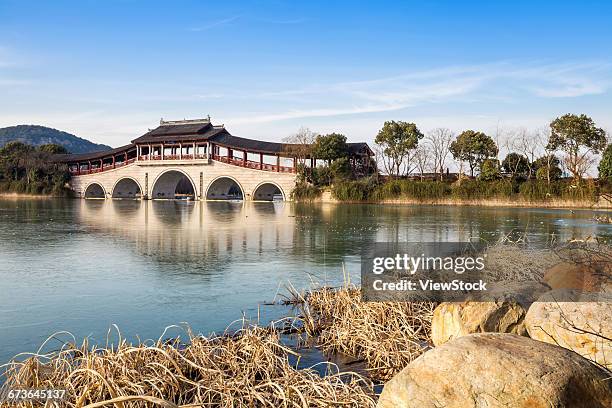
Lake Tai.
Planning Your Visit: A Practical Guide
Best Time to Visit
Lake Tai (太湖) is a year-round destination, but the best time to visit is during the spring (March to May) and autumn (September to November) months. During these seasons, the weather is mild, making it ideal for outdoor activities like walking and boating. Summer can be quite hot, especially in July and August, while winter may bring colder temperatures, which could limit outdoor enjoyment.
Recommended Itinerary
Half-Day Visit:
- Morning Stroll: Start your day early with a leisurely walk along the paved paths surrounding the lake. Enjoy the scenic views and vibrant flowers.
- Boat Ride: Hop on a boat to explore some of the nearby islands. The boat rides are included in your admission, allowing you to hop between various attractions at your leisure.
- Bird Watching: Bring your binoculars for a chance to spot various bird species. Early mornings are particularly good for birdwatching.
- Local Lunch: After your exploration, enjoy a meal at the restaurant located at one of the boat stops or venture into a nearby town for a taste of local cuisine.
Full-Day Visit: If you have more time, consider extending your visit to include nearby attractions such as Huzhou Taihu Lake Paradise or Qiucheng City Ruins.
Photography Tips
- Golden Hour: Plan your visit around sunrise or sunset for the best lighting conditions; the hues reflecting off the water are stunning.
- Details Matter: Capture close-ups of the unique flora and fauna. The flowers and mushrooms around the lake make for great macro shots.
- Wide-Angle Shots: Use a wide-angle lens to capture the expansive views of the lake and its surroundings.
- Bird Photography: If birdwatching is on your agenda, a zoom lens will help you get clear shots from a distance without disturbing the wildlife.
What to Wear
- Comfortable Footwear: Since you’ll be walking and potentially hiking, opt for sturdy shoes.
- Weather-Appropriate Attire: Dress in layers, especially if visiting in spring or autumn, as temperatures can fluctuate. In summer, light, breathable clothing is advisable.
- Sun Protection: With limited shade in certain areas, a wide-brimmed hat, sunglasses, and sunscreen are essential.
- Rain Gear: If visiting during the rainy season, bring a waterproof jacket and an umbrella.
Insider Tips
- Local Language: While many signs are in English, having a local guide or a Chinese-speaking friend can enhance your experience, particularly when navigating dining options or asking for directions.
- Avoid Peak Times: If possible, visit on weekdays to enjoy a quieter experience. Weekends can get crowded, especially during the summer.
- Stay Hydrated: Bring plenty of water, especially in the warmer months. Hydration is key while exploring on foot.
- Explore Beyond the Lake: If time permits, venture into Huzhou city to explore its unique cultural offerings, including local markets and historic sites.
- Respect Nature: As you explore, be mindful of the environment. Stick to designated paths and do not disturb wildlife.
Enjoy your visit to Lake Tai, where natural beauty and cultural richness await you!
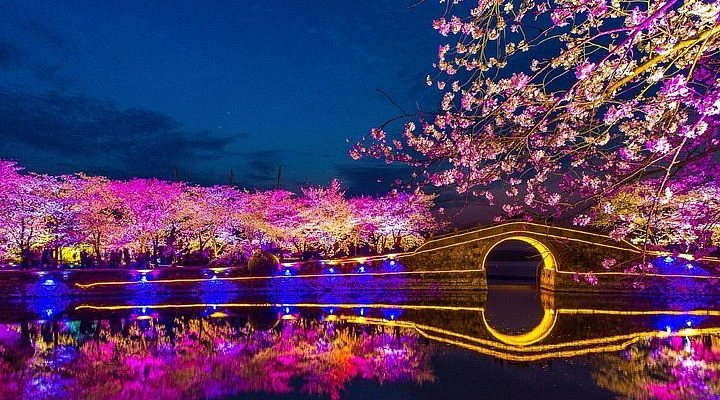
Lake Tai.
Tickets: Prices, Booking, and Tips
Visiting Lake Tai (太湖) offers a delightful escape into nature, with opportunities for scenic walks, boat rides, and bird watching. To enhance your experience, it’s wise to plan ahead regarding ticket purchases. Here’s what you need to know:
| Ticket Type | Price (CNY) | Includes |
|---|---|---|
| Standard Admission | 80 | Access to park areas, islands, and boat rides between locations. |
| Child Admission (under 1.2m) | Free | Access to park areas; must be accompanied by an adult. |
| Senior Admission (60+) | 40 | Access to park areas, islands, and boat rides. Valid ID required. |
| Group Ticket (10+ people) | 60 per person | Access to park areas, islands, and boat rides. |
Booking Your Tickets
Tickets for Lake Tai can be purchased at the entrance, but it’s highly recommended to book in advance to avoid long queues, especially during weekends and holidays when visitor numbers surge. Here are some tips on how to secure your tickets:
-
Online Booking: Many travel platforms, including local Chinese websites and international booking services, offer tickets for Lake Tai. You can easily select your date and receive an e-ticket for entry.
-
Travel Agencies: Consider booking through a travel agency that specializes in tours around China. They often provide package deals that include transportation and guided tours.
-
Local Hotels: Some hotels near Lake Tai also sell tickets at the front desk or can assist you in purchasing them online.
-
Arrive Early: If you choose to buy tickets on-site, arrive early in the day to avoid crowds and ensure you have ample time to explore the area.
Booking in advance not only saves time but also provides peace of mind. Enjoy your visit to this stunning destination, and don’t forget to bring water, a hat, and your camera to capture the picturesque landscapes!
How to Get There: A Complete Transportation Guide
Getting to Lake Tai: A Comprehensive Transportation Guide
Lake Tai (太湖), renowned for its stunning views and tranquil atmosphere, is a must-visit destination in China. Located near the city of Huzhou in the Zhejiang province, getting there is both convenient and accessible. This guide will help you navigate your way to and around this beautiful lake.
From the Nearest Major Cities
From Hangzhou
Hangzhou, known for its picturesque West Lake, is approximately 130 kilometers from Lake Tai. Here are your options:
- By Train:
- Duration: About 1.5 hours
- Cost: Approximately 60-100 CNY (8-15 USD)
-
Details: High-speed trains run frequently from Hangzhou East Railway Station to Huzhou Railway Station. Once at Huzhou, you can take a taxi or local bus to Lake Tai.
-
By Bus:
- Duration: About 2 hours
- Cost: Approximately 40-70 CNY (6-10 USD)
-
Details: Buses depart from Hangzhou’s main bus stations (like the Hangzhou Central Bus Station) and head directly to Huzhou’s bus station. From there, taxis are available to take you to the lake.
-
By Car:
- Duration: About 1.5 hours
- Cost: Varies based on rental and fuel
- Details: If you prefer driving, take the G25 Expressway directly to Huzhou. The route is well-marked and scenic, making for an enjoyable journey.
From Shanghai
Shanghai is about 180 kilometers from Lake Tai. Here’s how you can reach the lake from the bustling metropolis:
- By Train:
- Duration: About 1-2 hours
- Cost: Approximately 80-120 CNY (11-17 USD)
-
Details: High-speed trains depart from Shanghai Hongqiao Railway Station to Huzhou Railway Station. Similar to traveling from Hangzhou, taxis or buses will get you from Huzhou to Lake Tai.
-
By Bus:
- Duration: About 2.5-3 hours
- Cost: Approximately 50-100 CNY (7-15 USD)
-
Details: Buses leave from Shanghai’s major bus stations, including the Shanghai South Long-Distance Bus Station. Direct services to Huzhou are available.
-
By Car:
- Duration: About 2.5 hours
- Cost: Variable based on rental and fuel
- Details: Driving from Shanghai to Huzhou involves taking the G50 Expressway. This route provides a straightforward and picturesque drive through the region.
Getting Around the Scenic Area
Once you arrive at Lake Tai, exploring the area is both relaxing and enjoyable.
Public Transportation:
- Local Buses: Buses operate within the Huzhou area, offering access to various attractions around the lake. Fares typically range from 1-5 CNY (0.15-0.75 USD).
Boat Services:
- Island Transfers: One of the highlights of visiting Lake Tai is taking a boat ride to explore the islands. The boat services are included in the park admission fee, and boats frequently shuttle between various points on the lake.
- Duration: Rides typically last between 10-30 minutes, depending on the destination.
Walking and Biking:
- Exploring on Foot or by Bike: The park around Lake Tai is designed for pedestrian and bicycle access. Paved paths and flat terrains make it easy to stroll or cycle around while enjoying the scenic beauty. Bike rentals are available at various points, usually costing around 20-30 CNY (3-5 USD) per hour.
Tips for Your Journey
- Language: While major transportation hubs may have English signs, learning a few basic Mandarin phrases or having a translation app handy can enhance your travel experience.
- Weather Considerations: Bring a hat and water, especially in warmer months, as shade is limited around the lake.
- Plan for Crowds: Weekends and holidays can be busy, so consider visiting during weekdays for a more tranquil experience.
With this comprehensive guide, you’re well-equipped to enjoy the beauty of Lake Tai. Safe travels!
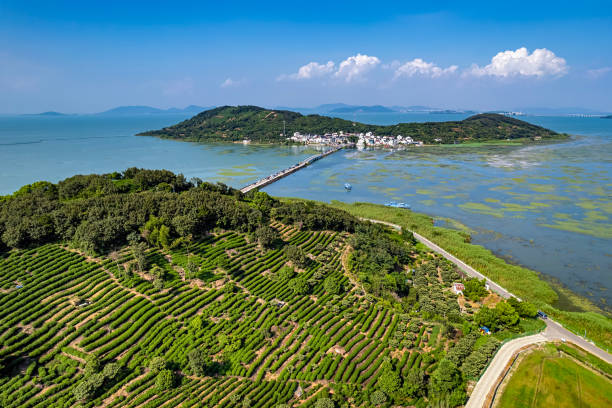
Lake Tai.
Local Cuisine and Accommodation Nearby
When visiting the serene Lake Tai (太湖), not only will you be captivated by its natural beauty, but you’ll also discover a rich tapestry of local cuisine and a variety of accommodation options to suit every traveler’s needs.
Culinary Delights of Lake Tai
-
Taihu Fish: This freshwater fish is a signature dish in the region, often served steamed with ginger and scallions. The delicate flavors highlight the freshness of the catch, making it a must-try for seafood lovers.
-
Suan Ni Bai Rou (Garlic Pork Belly): A beloved local delicacy, this dish features thinly sliced pork belly marinated in garlic and soy sauce, then steamed to perfection. The result is a savory, aromatic dish that pairs beautifully with steamed rice.
-
Stir-Fried River Shrimp: Known for its sweet and tender flesh, these river shrimp are typically stir-fried with a touch of garlic and seasonal vegetables. This dish showcases the freshness of the lake’s bounty and is often a favorite among visitors.
-
Lotus Root Soup: A comforting dish, this soup is made with sliced lotus root and often includes pork or chicken. It’s not only delicious but also offers a unique crunch and a hint of sweetness, making it a delightful starter for any meal.
Places to Stay Near Lake Tai
-
Luxury: Sheraton Huzhou Hot Spring Resort
Nestled by the lake, this resort offers opulent accommodations with stunning views. Guests can unwind in the luxurious spa, enjoy gourmet dining options, and take advantage of the resort’s private beach area, making it perfect for a lavish getaway. -
Boutique: Huzhou Jiuqu Hotel
This charming boutique hotel combines modern amenities with traditional Chinese decor. Located conveniently close to Lake Tai, it offers personalized service and a cozy atmosphere, making it an ideal choice for those looking to experience local culture. -
Budget: Huzhou Taihu Lake Youth Hostel
Perfect for backpackers and budget travelers, this hostel provides clean, comfortable dormitory-style rooms at an affordable price. Located near the lake, it offers a friendly atmosphere and opportunities to meet fellow travelers while exploring the area’s attractions.
With delightful local dishes and a range of comfortable accommodations, your visit to Lake Tai promises to be a truly memorable experience. Enjoy the flavors of the region and relax in settings that cater to every preference and budget!
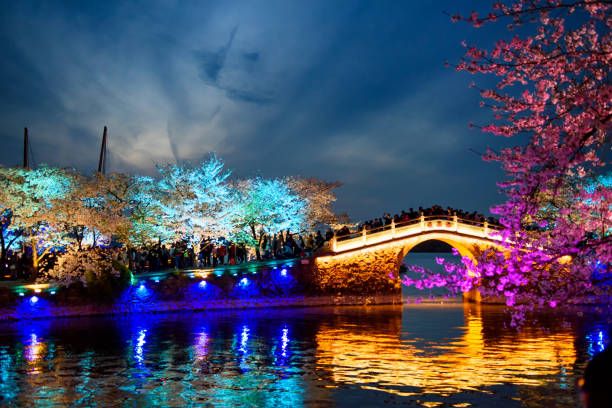
Lake Tai.
Frequently Asked Questions
-
Is Lake Tai suitable for children and the elderly?
Yes, Lake Tai is quite suitable for families and older visitors. The paths around the lake are paved and mostly flat, making it accessible for strollers and wheelchairs. However, it’s advisable to bring along sun protection and water, especially during the hotter months. -
Are there English signs and information available?
While some signage and information may be translated into English, it is limited. Having a local guide or a Chinese-speaking companion can enhance your experience. Consider downloading translation apps to help with communication. -
How much time should I plan for a visit to Lake Tai?
A half-day visit is typically sufficient to explore the main attractions around Lake Tai, including walking paths and boat rides between islands. If you plan to enjoy lunch at a local restaurant or engage in bird watching, consider extending your visit to a full day. -
What is the best time of year to visit Lake Tai?
The most pleasant times to visit are spring (April to June) and autumn (September to November) when temperatures are mild and nature is in full bloom. Summer can be quite hot, while winter may bring cooler temperatures. -
What activities are available at Lake Tai?
Visitors can enjoy walking, boating, bird watching, and photography. The park features several islands accessible by boat, offering a great opportunity to explore the diverse flora and fauna of the area. -
Are there dining options available around Lake Tai?
Yes, there are dining options available within the park, including a restaurant at one of the boat stops. Additionally, nearby towns offer various local eateries where you can enjoy regional cuisine. -
What should I bring for my visit to Lake Tai?
It’s recommended to bring sun protection, including a hat and sunscreen, as there are few shaded areas. Also, pack water, comfortable walking shoes, and a camera to capture the stunning scenery. -
How do I get to Lake Tai from major cities in China?
Lake Tai is easily accessible from major cities like Shanghai and Hangzhou by train or bus. The journey typically takes around 1-2 hours, making it a convenient day trip or weekend getaway.
Final Thoughts on Your Trip
As you prepare to conclude your adventure at Lake Tai, take a moment to reflect on the beauty and tranquility that this stunning destination offers. From the serene boat rides that glide between lush islands to the captivating landscapes that inspire both relaxation and exploration, your time here has likely been a feast for the senses. Whether you reveled in birdwatching amidst vibrant flora or enjoyed leisurely walks along the scenic paths, every moment spent at Lake Tai has been an opportunity to connect with nature and immerse yourself in local culture.
With its rich history, picturesque vistas, and welcoming atmosphere, Lake Tai is more than just a destination; it’s an experience that lingers long after you’ve left its shores. As you head back to your daily life, carry with you the memories of this enchanting place and the spirit of adventure that it embodies. Remember, the world is full of wonders waiting to be discovered—let your journey continue, and may the essence of Lake Tai inspire you to seek out new horizons wherever you go!